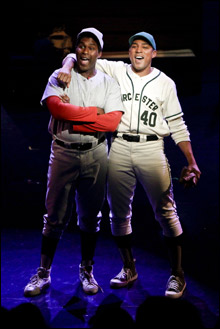Johnny Baseball is stuck in the minors
By STEVE VINEBERG | June 9, 2010
The high point of Johnny Baseball, the new musical receiving its world premiere from the American Repertory Theater (at the Loeb Drama Center through June 27), comes two-thirds of the way through the second act. "See You in the Big Leagues" is a duet for a young Willie Mays (Alan H. Green) and a fictional black ballplayer named Tim Wyatt (Charl Brown), both of whom have just tried out for the Red Sox. Jackie Robinson has recently broken the color barrier in the major leagues, and these two young African-Americans, high on their hopes for the future, share a song with an irresistible gospel swing that, as they used to say, brings down the house. It's boisterous and bright, and the two performers put it across splendidly.
AFTER SCHOOL SPECIAL Colin Donnell’s Johnny O’Brien is handcuffed by racism, but also by social-problem preachiness and conventional sentimentality. |
But though "See You in the Big Leagues" is pure gold, the rest of Johnny Baseball is the purest tin. The premise of the play — book by Richard Dresser, music by Robert Reale, lyrics by Willie Reale — is that the real curse that the Sox can't manage to shed till their 2004 World Series triumph isn't the result of team president Harry Frazee's decision to sell Babe Ruth (overplayed exuberantly by Burke Moses) to the Yankees at all. Rather, it's the deep-seeded Boston racism that prevents the most gifted pitcher in the team's history, Johnny O'Brien (a/k/a Johnny Baseball, and played by Colin Donnell), from marrying the girl of his dreams, a black jazz singer named Daisy Wyatt (Stephanie Umoh) whom he meets when the Babe and his cronies take the innocent young Johnny to a whorehouse where Daisy sings in the bar. Years later, when Johnny, whose broken heart has ruined his career, is coaching in the minor leagues, he discovers that Daisy bore his son — but when he lands the boy a tryout for the Sox, that same prejudice prevents both Tim and Willie from getting the contracts they deserve.The script pumps out its message in the style of an After School Special, except when it returns to its frame: Game 4 of the 2004 American League Championship Series, where, between innings, a baseball-mad boy named Robby (Erik March) learns the story that trumps the Curse of the Bambino from a mysterious codger (Charles Turner) in the stands. The scenes built around the fans seem to come from some other musical altogether, and the numbers they generate — such as a duet between a long-engaged couple that steals shamelessly from the Nathan-Adelaide plot of Guys and Dolls — are embarrassingly transparent efforts to pander to the Red Sox spirit in the audience. Except for "See You in the Big Leagues" and a witty comic trio called "Mr. Yawkey Has a Vision" (about Frazee's successor, played by Jeff Brooks, whose "vision" is the eternal whitewashing of the team), the Reales' songs are melodically undistinguished and lyrically overstated, but at least they serve the flashback story — even though the post–Andrew Lloyd Webber Broadway-pop style doesn't suit the era. (The Reales should have drawn more on big-band and old-school-musical-comedy models.) In the 2004 scenes, the songs feel tacked on out of desperation, a problem that's exacerbated by the hammy performances.
 Related
Related:
Play by Play: March 19, 2010, Play by play: March 26, 2010, Play by play: May 7, 2010, More 
- Play by Play: March 19, 2010
Boston's weekly theater schedule.
- Play by play: March 26, 2010
Boston's weekly theater schedule
- Play by play: May 7, 2010
Boston's weekly theater listings
- Opera singer teaches Sox fans how to scream
If Elena Zoubareva had the nerve to admonish boisterous fans outside Fenway Park, she’d offer, calmly, “Don’t scream like that — you’ll strain your vocal cords!”
- Pedal promise
Boston has its fair share of deserving bad reputations: the sports fans whined for some 86 years about a “curse” because the Red Sox couldn’t seal the deal; the drivers are terrible; and, thanks in no small part to those driving skills, the city’s streets were thrice voted by Bicycling Magazine as some of the worst in the country for cyclists.
- Play by play: May 28, 2010
Boston's weekly theater schedule
- Jocktail Party
This past Sunday night, behind Fenway Park, a subtle yet symbolic changing of the Boston sports-media guard occurred, giving unprecedented power to the people.
- Play ball!
Red Sox fans are well versed in the creation myths of the team’s Dominican stars.
- Play by play: April 2, 2010
Boston's weekly theater schedule
- Molten metal
Let’s cut to the chase — metal is back. And not just as a popular musical style, but as a subculture, freely seeping into the mainstream in a variety of strange ways, from the bullet belts you see on a dance floor to the devil horns being thrown by everybody and your uncle’s band.
- Prospect Park
Yes! Baseball season is finally here. All is as it should be in the world, if not with the Red Sox, who have had a tough start. But that’s OK.
- Less

 Topics
Topics:
Theater
, Entertainment, Diane Paulus, AL East, More  , Entertainment, Diane Paulus, AL East, Robert Reale, Willie Reale, American Repertory Theater, Lifestyle, Arts, Entertainment, and Media, American League (MLB), Johnny Baseball, Less
, Entertainment, Diane Paulus, AL East, Robert Reale, Willie Reale, American Repertory Theater, Lifestyle, Arts, Entertainment, and Media, American League (MLB), Johnny Baseball, Less 